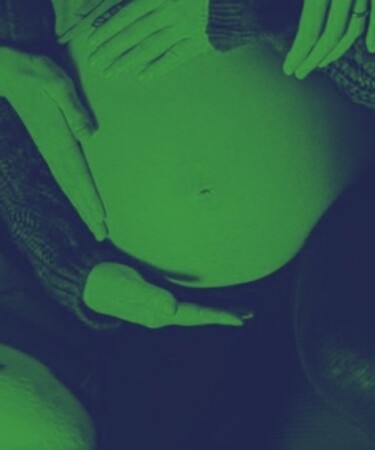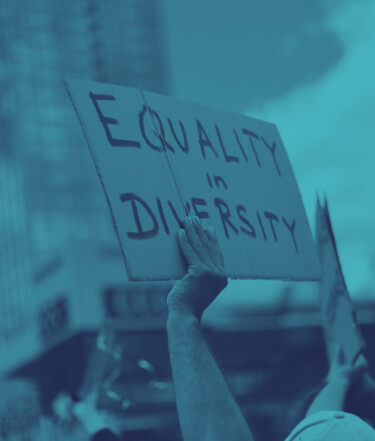
Equal rights for all families
Queer married couples are discriminated against when they have children. We go to court for equal rights for all parents and children - with first victories.
The married couples had a child and are fighting in court to have not only the biological mother, but also her spouse registered as the child's parent on the birth certificate. The registry offices refuse to register both couples because the legal provision in § 1592 No. 1 BGB only allows husbands to be the parent of their child as "fathers".
From the authorities' point of view, Gesa and Verena Akkermann's daughter has only one parent because the couple consists of two women. The Celle Higher Regional Court has referred their complaint to the Federal Constitutional Court in March 2021.
The child of Tara and Tony E. also has only one mother because Tony E. has a "diverse" legal gender marker. Their case is still pending before the Frankfurt Higher Regional Court. Both families are discriminated against on the basis of the gender of one spouse.
The law discriminates against non-heterosexual couples
Heterosexual couples can be registered as parents on the birth certificate within and outside of marriage, regardless of whether their child is biologically descended from both partners. Legally, the parent-child relationship is regulated in such a way that a man automatically becomes the "father" of a child if he is married to the "mother" at the time of birth (§ 1592 No. 1 BGB).
Biological parentage is not asked about. For good reason, because parenthood can also be the conscious decision in a partnership to jointly raise the child with which one person is pregnant - for example after a sperm donation or after an affair. Nevertheless, the registration of the second parent currently fails for many couples due to the wording of the provision in § 1592 No. 1 BGB. This affects lesbian couples raising children together, but people with a "diverse" or no gender marker as well as trans men are similarly not always legally recognised as parents.
This means that the spouses of the people who gave birth to the child they want together have to adopt it - an inappropriate procedure that often drags on for years. This is what our plaintiffs are going to court against. They want to be registered as parents in the birth register under the same conditions as men.
The adoption procedure entails insecurity for the entire family
The adoption procedure is completely inappropriate for the two families we support. Here, it is not partners who want to adopt the child of a single parent as a "stepchild", but married couples who jointly planned their family, went through a pregnancy together and gave birth to a child. In an adoption procedure, the court and the youth welfare office check, among other things, the bond with the child, the financial situation and the state of health of the spouse who wants to adopt the child. Youth Welfare Offices often start the examination only after one year, because they assume that only from this time onwards a bond with the child can be proven.
For parents who are raising their child as a jointly desired child, the adoption procedure is a time of anxiety. Legally, the child has only one parent - and hence also no maintenance claims or inheritance claims against the second parent. The child would even be an orphan if something happened to the parent who is already legally recognised. The complaining families do not want to accept these uncertainties.
Disadvantaging the families supported by the GFF is unconstitutional
The discrimination against the two families we support violates the prohibition of discrimination in Article 3 (3) of the Basic Law. Discrimination on the grounds of gender is prohibited. Discrimination against spouses simply because they are not men is therefore unlawful. Our legal system recognises marriage for all, and it recognises that there are more than two genders. These decisions must be consistently enforced and the families concerned must be granted protection and legal certainty.
The argument often put forward that children in non-heterosexual family constellations are not descended from both adults does not justify the discrimination either. For good reason, biological descent is not even checked in the case of men who are registered as the "fathers" of their child. A heterosexual couple, for example, can also opt for sperm donation. In addition, there are also families in which the parenthood of one partner is not recognised, even though the child may very well be descended from both parents, for example, if the second parent is a sperm donor but correspondingly to their gender identity does not have a male gender marker.
In addition, the lack of recognition of the second parent also violates the fundamental rights to special protection of marriage and family under Article 6(1) of the Basic Law and to parental care and upbringing under Article 6(2) of the Basic Law. This is because both parents, but also the child, are deprived of legal safeguards and protection that our legal system actually provides for families.
Enforcing equal rights for all parents by going to court
Currently, registry offices and courts refuse to register second parents unless they are men. Reform proposals by the Greens and in the Federal Ministry of Justice failed in the last legislative period. Unfortunately, they dealt exclusively with dual motherhood - and would not have ended discrimination for all affected groups of individuals. That is why we are now supporting two families up to the Federal Constitutional Court on behalf of all the other families.
The GFF is working on the case in an alliance with the Nodoption initiative. This initiative accompanies other families and case constellations in strategic lawsuits before the courts. These cases, which we and the initiative support, show how families are currently discriminated against in the recognition of parenthood. Diverse family constellations shape our society. About 14,000 children in Germany grow up with non-heterosexual parents. In this respect, our cases are exemplary for countless disadvantaged families. We support the plaintiffs in their fight against this deplorable state of affairs - together with the lawyers Friederike Boll and Lucy Chebout.
The Berlin lawyer Lucy Chebout from the law firm Raue started representing Verena Akkermann and Dr. Gesa C. Teichert-Akkermann after the couple went to the family court in Hildesheim on 15 January 2020. Their daughter Paula was born on 13 February 2020. In proceedings concerning personal status before the family court in Hanover, they applied to oblige the competent registry office to issue a correct birth certificate with both parents for Paula. The AG Hannover rejected this application in a decision of 22 July 2020 (ref. 85 III 21/20). They also applied for a declaration in family court proceedings that Verena Akkermann is legally Paula's second parent. The Hildesheim Local Court also dismissed their application in this regard by order of 3 July 2020 (ref. NZS 67 IV 3/20). Both proceedings were combined in the second instance at the Higher Regional Court (OLG) Celle, which held a hearing on 13 January 2021 (21 UF 146/20, 21 W 8/20). On 24 March 2021, the Higher Regional Court of Celle concurred with our opinion: The current law on parentage is unconstitutional. The Higher Regional Court therefore suspended the proceedings and is submitting the case to the Federal Constitutional Court for a decision. However, it may take some time before the Federal Constitutional Court reaches a decision.
Tara and Tony E.* are represented by the lawyer Friederike Boll from the Frankfurt law firm geRechtsanwältinnen. After Tony E. was not entered as the second parent on daughter B.'s birth certificate by the responsible registry office, the family applied to the Frankfurt am Main Local Court in February 2020 to instruct the registry office to make the entry. In order to secure the child's legal status as quickly as possible, Tony E. also began adoption proceedings. Following the success of the adoption proceedings, the family changed their application and applied to the Local Court for a declaration that the original refusal of the registry office to register Tony E.'s parenthood was unlawful. The Frankfurt am Main Local Court rejected this application as inadmissible in February 2021. In April 2021, the family substantiated their appeal against this decision. The opinion of the Local Court that the successful adoption meant that there was no longer a legally protectable interest in a court decision is not tenable. According to the case law of the Federal Constitutional Court, the interest in a judicial clarification remains if serious encroachments on fundamental rights are involved or a repetition must be avoided. Now the decision of the Higher Regional Court of Frankfurt am Main is pending.
* To protect the family from attacks, we use pseudonyms.



